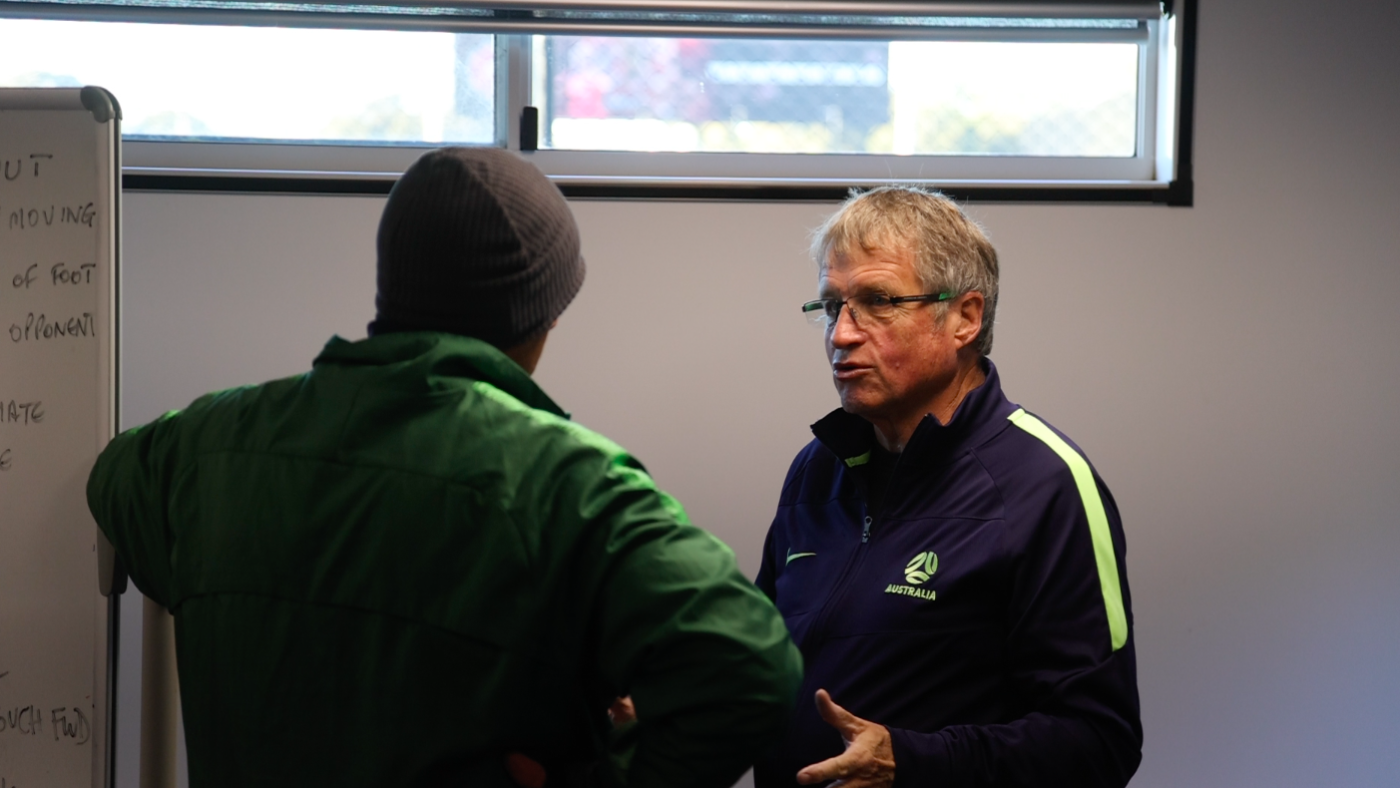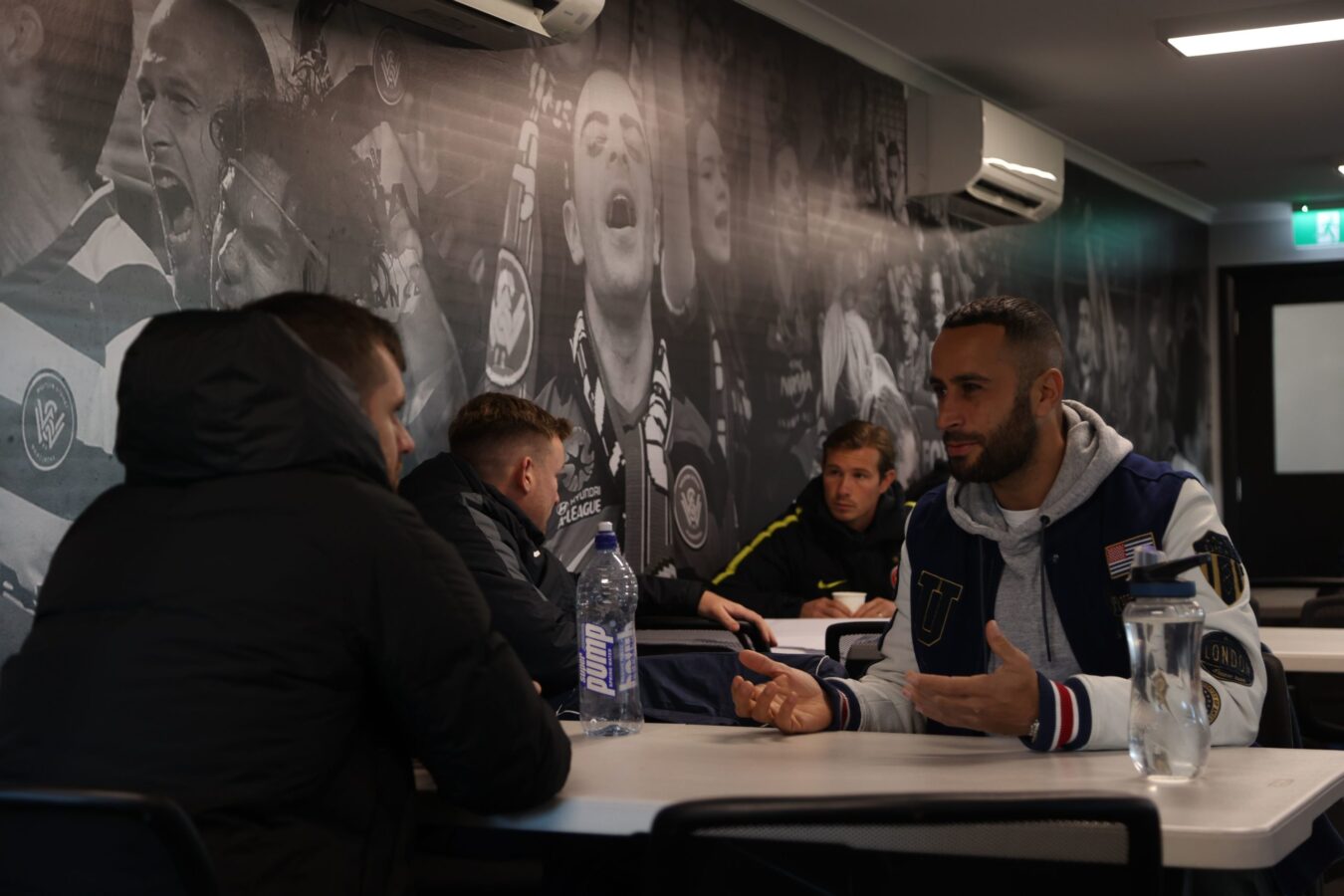For the next generation of Australian coaches, education and a commitment to life-long learning is essential for the future transition into senior coaching roles.
That’s the view and advice from Football Australia’s Technical Consultant Ron Smith, who helped to deliver C and B Licence courses for current and former A-Leagues players at Western Sydney Wanderer’s Centre of Football, in partnership with the PFA, last month.
Converging on the Wanderers’ facility in June, Smith delivered a week of coach education for aspiring coaches, with the likes of current A-Leagues players Nick Fitzgerald and Liam Reddy and recently retired Andrew Durante, Tarek Elrich, the PFA’s own Cameron Watson and former W-League defender Servet Uzunlar among the group of 30 current and former players in attendance.
Smith, previously a technical analyst for the Socceroos and coach at the Australian Institute of Sport, said that while earning the mandatory coaching badges are important to career progression, building an understanding of coaching methods, philosophy, and practical preparation skills is critical – and can benefit not just aspiring coaches but also current players in their development on the pitch.
“As a young player in the UK, I went to college and got interested in coaching at 19 years of age. I just wanted to know more about the game, so I started doing my coaching courses when I was playing and it helped me enormously as a player,” Smith told pfa.net.au.
“I think that’s one of the biggest bonuses of starting a coaching career when you’re playing and it also encourages you to stay in the game.”

Hoping to stay in the game after he hangs up the gloves is Perth Glory’s goalkeeper Liam Reddy. An A-Leagues and National Soccer League icon with over 400 national league appearances, Reddy is aware he has entered the twilight of his career and has benefited immensely by preparing for his post-career transition. Having completed previous coaching courses, the latest licences undertaken in Blacktown will place him a position to pursue a career in goalkeeper coaching in the future.
“I’m getting myself ready for life after football. I really want to emphasise being a goalkeeper coach… and helping younger players learn and improve and hopefully one day work in a first-team environment,” Reddy said.
Uzunlar, who hung up the boots in 2019 after featuring at two FIFA Women’s World Cups for the Matildas and has since transitioned into coaching at the International Football and Tennis School, said the coaching courses provide a new perspective for her coaching delivery.
“When you’re a player you don’t look at things like a coach would so putting that hat on and understanding things from that side has been fantastic. I guess when you’ve played the game and played it for most of your life, it’s kind of natural for players to step into that coaching role, so for me it was a natural progression in that sense.”
As for the course content, Smith said the players had built a greater understanding of the coaching pathway, methods and practical skills across both the C and B Licences.
“The C-Licence course is essentially about the teaching of technique and understanding the principles of play, plus all of the things that are part of coaching, such as the role of the coach, how you organise practice, what sort of practices you might use and why, how long you have players doing activities for, due to the physiological impact to the body,” Smith said.
“The B-Licence is about how do you use techniques within a game. It’s moving from ‘how do you perform them’ to ‘when do you combine and use them to actually play football?’. The B-Licence is extending the knowledge base of what you need as a coach but going that next step where you’re going to be teaching people how to play football and apply the principles of play. There’s a few more add-ons; skill acquisition, sports psychology and the conditioning of the game is involved. It’s a gradual building up of knowledge of a lot of basics of coaching.”

The learning never stops, however. Smith says that coaching is a life-long commitment and that players need to continually put into practice what they learn. When a player embarks on a career in coaching, it’s akin to starting their playing career from scratch.
“My first coaching job was in 1975… there’s not start and end point. It’s a gradual process – the longer you’re in it, the more you’re trying to hone your skills.
“It’s a case of taking what you’ve learned – and people don’t just learn on the coaching course – they learn a bit more about the theory behind playing the game and how you might analyse football and that often might change the way you see things.
“But the most important thing is that when players actually get a job, it’s a bit like you’re starting playing again… you need to spend time honing the craft.”
For Smith, one advantage is that professional players do have an advantage: they’re easily coachable on the practical and theory.
“It’s always enjoyable when you work with professional players whether they are former or current players because they are so aware of what you are trying to achieve, because that’s their job. They are easy to work with because they have good knowledge of the game, so your job is helping them communicate ideas and how you can get messages and information out to people who are maybe aspiring to become a professional footballer, or who just want to get more fun out of the game and how to organise practice.”
“This particular group have been lovely and they’re all keen as mustard to be let loose and get out there to coach people.”
To find out more about how the PFA helps encourage players with Coach Development and off setting the costs of licences, please contact your PFA Player Development Manager.







